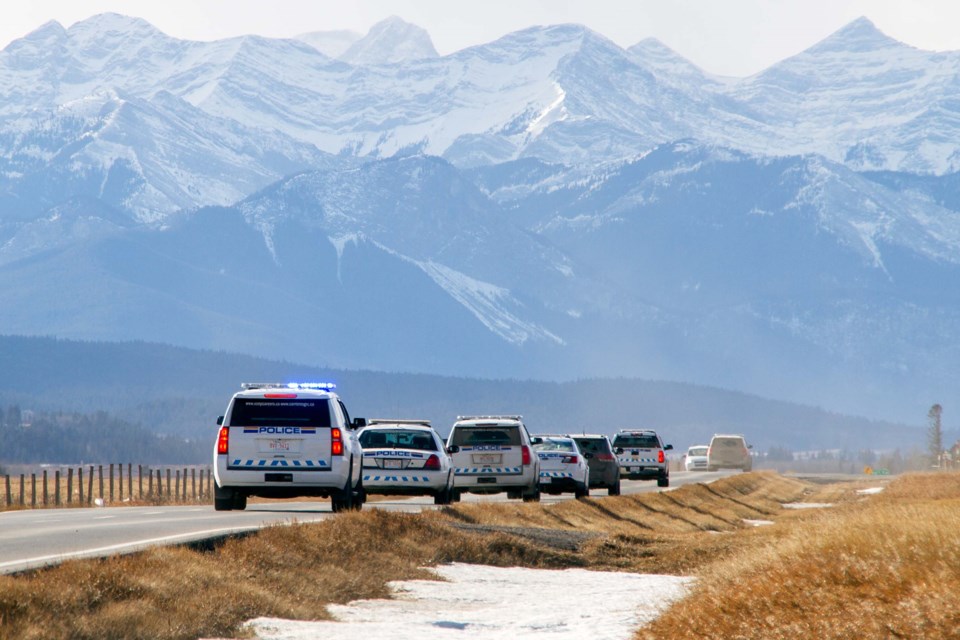The Stoney Nakoda First Nation has been beset by crime of late and many are pointing to drugs as the source of the strife.
So far in 2017 there has been one homicide, a kidnapping, and a person wielding a rifle in their grandmother’s house. The crimes resulted in numerous charges and a suspect in one of the murders being killed by police after a standoff at a home in Morley. Police are also investigating two sets of human remains discovered in the area in the past month.
RCMP officers confirmed last week “there has been a shift in the drug culture.” In the community
The high number of violent incidents also have residents questioning what will happen next.
“There is a deep concern about what is going on – people say it is getting scary,” said Tina Fox, Nation resident and well-known elder.
Fox has felt firsthand the effects of drugs on the Nation, after losing a grandson to an accidental overdose, suspected fentanyl, in 2014.
“We are going to have to do something. There are young people dying,” Fox said solemnly.
On Tuesday, the Alberta Government stated that 343 people in the province died of apparent drug overdoses related to fentanyl last year – a drug that has been prevalent in the Nation.
“Fentanyl has gone around the province as of late and Stoney has definitely been affected by that … we are coming across a lot of files attending complaints for possible overdose, successful overdose or other crimes where fentanyl is a part of it,” said Cpl. Troy Savinkoff with the Cochrane RCMP.
“There seems to be a transition in the drug culture that may be contributing to an increase in violence in the last year.”
In addition to fentanyl, last May, Cochrane RCMP officers said there was a rise in methamphetamine use on the reservation due to “an influx of outside people going into Morley.”
Stoney Nakoda Nation, which consists of three bands – Wesley, Chiniki and Bearspaw with an estimated population of 6,000 residents – announced last summer that addiction rates among the adult population were as high as 60 per cent.
“It is mindboggling to think of all the losses – the community is in constant sorrow,” Fox said.
Pinning foxes point is the fact, since January 2015 there been four homicides in the community.
Nation resident and substance abuse counsellor Myrna Kootenay said despite people in the Nation having personal addiction issues, “people have never resorted to this type of crime.”
Kootenay is still grieving from the death of her relative, Wilfred Jr. Amos, who was murdered on the Nation Jan. 22, 2016.
“Mental illness is a huge factor and the majority of the time it goes undetected in the Nation … it goes far beyond the drug use, it is related with intergenerational trauma – the biggest thing is parenting, it affects a persons ability to parent, standards get lost,” Kootenay said.
Kooteny explained that the residential schools First Nation people went through for 100 years in Canada – last one closing in 1996 – is still affecting generations to this day, due to a loss of “culture, language and identity.”
“When you are a survivor of residential school, you have to work really hard at changing and conditioning – it is like that for a lot of Stoney people, they have to re-learn and get well,” Kootenay said.
“The crimes you are seeing now, it is far from the Nakoda way of life and values. For the community members that are trying to live a peaceful life, it is shocking – it is almost like it is not real … People aren’t doing things in their right minds, something is going on there. It is just not normal”
Acting tribal administrator Ken Christensen said there has been an increase in “the problems and deaths on the reserve resulting from an increase of drug use, particularly opioids.”
“We are looking at policing, some new bylaws, prevention programs and rehabilitation because we don’t think we are going to see much improvement unless we handle it in a multifaceted way,” Christensen said.
Under the RCMP First Nations Community Policing Service, the Cochrane detachment has a Community Tripartite Agreement (CTA) with the Nation and staffs two full-time CTA positions on the reservation who work to promote community programs on the reservation. Additionally, from the 20 RCMP officers at the Cochrane detachment, there are approximately four designated to the reservation but all officers responds to calls from the Nation, Savinkoff explained.
“Cochrane detachment is one of the busiest in Southern Alberta. We do have members working on projects to deal with the issues and we are taking proactive measures,” Savinkoff said.
The Nation also has one program through the Stoney Health Services titled Turning Point offering psychological services Monday to Friday from 8:30 a.m. to 4:30 p.m., but Christensen said he would like to see a rehabilitation centre.
“We don’t have a full solution yet … but we are really facing the same problems that exist across Canada,” Christensen said.
Officials are also looking into a residency bylaw, which would “help get undesirables off the reserve,” the acting tribal administrator stated.
While controversial, Samson Cree Nation in Alberta had a similar bylaw pass in 2012 that allowed chief and council the right to screen and evict residents.
The Cpl. added there have been a number of high-profile arrests in Stoney Nakoda of late.
“With the recent events, the murder and the kidnapping, there has been significant arrests made (but) it is unclear what affects that will have in the crime going forward,” Savinkoff said.




